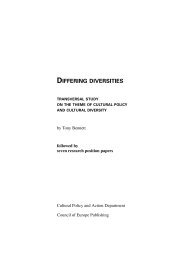Why we need European cultural policies: the impact of EU ...
Why we need European cultural policies: the impact of EU ...
Why we need European cultural policies: the impact of EU ...
You also want an ePaper? Increase the reach of your titles
YUMPU automatically turns print PDFs into web optimized ePapers that Google loves.
Instead <strong>of</strong> a conclusionThe aim <strong>of</strong> this study was to analyze <strong>the</strong> <strong>impact</strong> <strong>of</strong> <strong>EU</strong> enlargement on <strong>cultural</strong> <strong>policies</strong> in transitioncountries and in <strong>the</strong> light <strong>of</strong> that, to explore <strong>the</strong> <strong>need</strong> for <strong>European</strong>-level <strong>cultural</strong> <strong>policies</strong>.My project used <strong>the</strong> example <strong>of</strong> <strong>EU</strong> enlargement to ask <strong>the</strong> following questions:■■■■Which are those `o<strong>the</strong>r’ shared <strong>policies</strong> that affect <strong>cultural</strong> <strong>policies</strong>?Is <strong>the</strong> influence <strong>of</strong> such <strong>policies</strong> positive or negative?What are <strong>the</strong> responses to <strong>the</strong> enlargement from new <strong>EU</strong> member states?Are <strong>the</strong>re some measures that <strong>the</strong> <strong>EU</strong> should adopt to counterbalance <strong>the</strong> <strong>impact</strong> <strong>of</strong>cross-cutting measures – such as taxation – on <strong>cultural</strong> <strong>policies</strong>?This research has come up against numerous obstacles; as a result many important elementshave been left out altoge<strong>the</strong>r or mentioned only marginally. Some questions remained unans<strong>we</strong>redei<strong>the</strong>r because it was difficult to ga<strong>the</strong>r necessary information and data, or it was simply toosoon to assess certain processes. Ho<strong>we</strong>ver, from <strong>the</strong> beginning <strong>the</strong> idea was to argue for moreresearch and for more consideration <strong>of</strong> <strong>the</strong> <strong>need</strong> for fur<strong>the</strong>r integration <strong>of</strong> <strong>cultural</strong> aspects in <strong>the</strong><strong>EU</strong>’s policy-making.It is difficult to predict how <strong>European</strong> integration is going to proceed, especially after <strong>the</strong> rejection<strong>of</strong> <strong>the</strong> Draft Constitution in 2005 by two founding <strong>EU</strong> member countries and <strong>the</strong> current debatesabout <strong>the</strong> <strong>need</strong> for future enlargement. Still, it is likely that <strong>the</strong> liberalization and integration <strong>of</strong> asingle market will continue. If so, <strong>European</strong> <strong>cultural</strong> <strong>policies</strong> will face a dilemma; in <strong>the</strong> name <strong>of</strong>`democratization’ <strong>the</strong>y will want to broaden access to <strong>cultural</strong> goods and at <strong>the</strong> same time, <strong>the</strong>ywill be concerned about liberalization, again in <strong>the</strong> name <strong>of</strong> `democratization’, destroying <strong>the</strong>effects <strong>of</strong> <strong>the</strong>ir own measures (Breznik 2004).The solution <strong>of</strong> this dilemma has to be found. I believe a common <strong>cultural</strong> policy for <strong>the</strong> <strong>EU</strong> couldhelp to ensure that culture is treated equally with o<strong>the</strong>r sectors. It would also lead to <strong>the</strong> creation<strong>of</strong> measures to protect and promote <strong>cultural</strong> diversity and would ensure equal respect for both <strong>the</strong>economic and <strong>the</strong> <strong>cultural</strong> aspects <strong>of</strong> <strong>cultural</strong> goods and services.This brings me back to <strong>the</strong> beginning <strong>of</strong> <strong>the</strong> study and its discussion <strong>of</strong> <strong>the</strong> definition <strong>of</strong> cultureand <strong>the</strong> methodology for research <strong>of</strong> <strong>cultural</strong> <strong>policies</strong>. Even though <strong>the</strong>re are both some legalbarriers and political unwillingness to change current treatment <strong>of</strong> culture in <strong>the</strong> <strong>European</strong>Union, I believe that an equally important obstacle lies in in <strong>the</strong> existence <strong>of</strong> so many conflictingunderstandings <strong>of</strong> <strong>the</strong> definition, main scope and goals <strong>of</strong> <strong>cultural</strong> policy. This prevents anyconsensus on possible common goals <strong>of</strong> <strong>cultural</strong> <strong>policies</strong> and, even more importantly, commoninstruments for achieving those goals. I believe that <strong>the</strong>re is a <strong>need</strong>, <strong>the</strong>refore, for more policyorientedresearch <strong>of</strong> culture and also that it is necessary to realize that culture will be moreand more dependent and interlinked with o<strong>the</strong>r <strong>policies</strong>, especially where its economic ortechnological aspects are becoming dominant.Instead <strong>of</strong> a conclusion75














